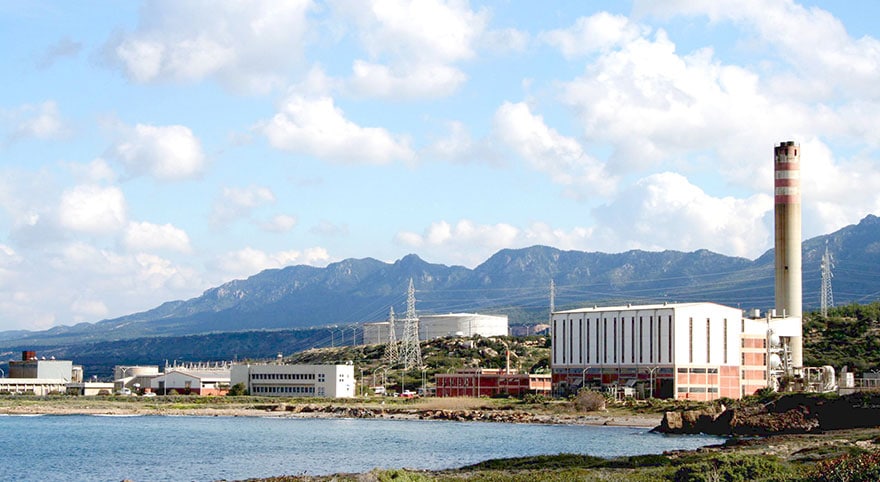The north suffered a total of 5,277 power cuts in 2022, two times worse than in Pakistan
Plans to create an electricity cable link from Turkey to the northern part of Cyprus are far from transparent, with experts warning that if the interconnection method isn’t implemented, the Turkish Cypriot electricity woes would be worsened rather than alleviated.
In recent weeks, newly re-elected Turkish President Recep Tayyip Erdogan and his vice president Cevdet Yılmaz, who paid separate visits to the island, listed among their priorities an undersea electricity cable project from Turkey to put an end to the power cuts in the north. This was taken as a sign that the project that has been voiced occasionally for the last decade will finally materialise.
Turkish Cypriots have been suffering from sweltering power cuts mainly due to lack of necessary investments in the electricity infrastructure and frequent fuel shortages. There were a total of 5,277 power cuts in 2022 according to economist Mertkan Hamit, which makes the country two times worse than Pakistan with the worst average monthly electricity supply according to World Bank data.
Moreover, as electricity is mainly produced using imported fuel oil, high electricity prices due to the volatility in fossil fuel prices, the war in Ukraine and the depreciation of the Turkish lira, are crippling the community. The price of electricity increased by over 190 per cent since the beginning of 2022, according to the figures from the Turkish Cypriot statistics department.
But will the undersea cable project, which according to Turkish ambassador Metin Feyzioglu, would cost US$780 million (€717 million) solve the problem?
While the finer details of the cable project have not been made public, experts are expressing concern over the lack of transparency and warning that if the plan is to merely buy electricity from a power generator in Turkey through a one-way system rather than an interconnection permitting a two-way transmission of electricity between Turkey and the north, this would worsen energy supply security and further increase prices.
“I fear that the project on the table right now might merely be an electricity transfer without interconnectivity,” says Ozdil Nami, who was responsible for the energy dossier in the north between 2018 and 2019.
“The truth of the matter seems to have changed.”
There are political difficulties in front of establishing an interconnection with Turkey, as the country is an observer member of the European Network of Transmission System Operators for Electricity (ENTSO-E), energy economist and electrical engineer Yusuf Avcıoglu explains to the Cyprus Mail.
ENTSO-E, which unites European Union member states’ transmission grids, was established by EU countries in 2009 to increase energy supply security. There is a permanent connection between Turkey and the ENTSO-E’s Continental Europe grid since 2015 via Bulgaria and Greece.
“ENTSO-E is the ultimate arbiter regarding the connection of a third state to the main grid,” says Avcıoglu, who is also the former vice-chairman of the board of directors of the Turkish Cypriot electricity authority Kıb-Tek. “Therefore, ENTSO-E’s permission and approval is needed for any interconnection made by Turkey.”
According to Avcıoglu, as long as the Cyprus problem remains unresolved, ENTSO-E will not grant a permit to Turkey to make an interconnection with the northern part of Cyprus, and the only method that can be approved and implemented at the moment is the “isolated area feeding” method.
This is exactly the method the experts are warning against.
“This means electricity can only be transmitted one way by Turkey to the north through a power generator set up separately from the main grid,” Avcıoglu says. “This is not interconnection. A two-way transmission will be impossible. We would not be able to export the power generated by solar energy.”
Besides a solar farm, households in the north have the right to set up solar panels and sell to the grid.
A simple one-way cable rather than an interconnection would be detrimental for the Turkish Cypriot community Nami tells the Cyprus Mail.
One of the biggest risks is becoming dependent on the electricity supply from Turkey.
According to reports, the cable from Turkey “will meet one thirds of the total demand. This is a huge share. The smallest problem or failure would make the country plunge into darkness,” says Nami. “On top of that, we would not be able to sell our extra electricity generated by solar panels and the electricity prices would spike because the investment cost of this huge project plus all the operational and other expenses would be reflected in the electricity bills.”
In this case, it is vital that other alternatives are considered, experts say.
Caglayan Cesurer, the president of the Cyprus Turkish Electricity Authority Workers Union (EL-SEN), also made a statement warning about the risks or the project.
“If you connect the north to Turkey through a system which will allow us to buy electricity when needed and to sell electricity when needed, then go ahead,” said Cesurer. “But what you are trying to do here is to set up a system for a one-way purchase from a power generator in Turkey. At all costs, we will never allow a one-way sales agreement with Turkey through a cable.”
A question that arises at this point is, would Turkey, which has an income of about €2 billion per year as a result of its membership in ENTSO-E, go ahead with an interconnection with the northern part of Cyprus and risk being sanctioned?
“It is possible,” says Nami. “It is totally up to the political will of Turkey.”
Nami says that during his tenure in 2018, there was not enough political will on the part of Turkey to push forward with this.
“Turkish officials wanted to realise the project but also did not want any problems with ENTSO-E.”
However, Nami also relays to Cyprus Mail that during his meeting with ENTSO-E officials in Brussels the same year, he was told that Turkey would not be massively sanctioned if it went ahead anyway and made an interconnection with the north without ENTSO-E’s permission, as many member countries are benefitting significantly from Turkey’s presence on the grid.
As the Turkish Cypriot community awaits to find out about the details of the cable project,
Olgun Amcaoglu, who is currently responsible for the economy and energy dossier in the north, recently told reporters that the Turkish Energy and Natural Resources Minister Alparslan Bayraktar “has assured us that there would not be any problems with ENTSO-E”.
Clearly clueless about the plans, Amcaoglu concluded: “President Erdogan also conveyed to us that they are taking full responsibility.”







Click here to change your cookie preferences